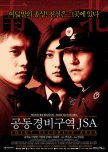This story is told in the form of an investigation into an incident on the JSA. I enjoyed this manner of storytelling as it peeled back the layers of each version of stories, to reveal the final truth of what really happened that fateful evening. As such, it has a mix of thrills, action and some humour. Gunfire and battles are not central to the story, and it remains suspenseful to the end.
About the geopolitical aspect of the story, it is certainly an optimistic and dramatized take on what really goes on at the JSA, a reflection of Korean sentiment at the time of its making. It raises the question of whether the mutual distrust of almost 60 years can be overcome, and this is painfully highlighted in the climax of the movie. The introduction of the background to Lee Young Ae's character felt like a last minute addition to the story and didn't add anything of significance to the story for me, though it may be of significance in the history of the Korean War.
Song Kang Ho gives a very controlled performance, and I've enjoyed many of his subsequent movies. Lee Young Ae plays a non-resident Korean and so uses English heavily during the show, which, being a non-native language, does make her delivery awkward and affects her portrayal during those chunks of dialogue. However, she still does a better job than the English you hear from Korean actors in many contemporary Korean dramas, so it's hard to fault the movie for that. Lee Byung Hun's character's story and the gravitas of his character is certainly handed to him on a silver platter and he does a good job of it.
Overall, a movie worthy of its place in the history of Korean film.
Was this review helpful to you?
























